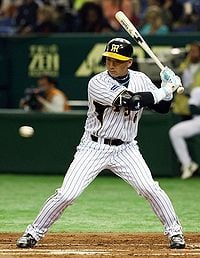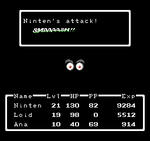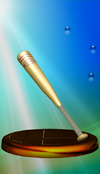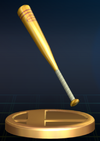Home-Run Bat
| Home-Run Bat | |
|---|---|
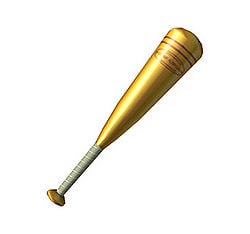 Home-Run Bat artwork from Brawl. | |
| Universe | Super Smash Bros. |
| Appears in | SSB Melee Brawl |
| Item class | Battering |
The Home-Run Bat (ホームランバット, Hōmu Ran Batto) is a battering item in all three Smash Bros. games and is best known for its one-hit KO potential. Unlike other battering items, when the player executes a forward smash, the character will rev up for longer-than-normal period of time and then swing the bat. If it connects, it causes tremendous knockback, more than enough to KO the opponent in most circumstances. Additionally, when thrown, it causes over 20% damage, making it one of the most dangerous items in the game.
The Home-Run Bat is used in the Home-Run Contest to knock the Sandbag as far as possible.
Mechanics
Tipper
Forward smashes with the Home-Run Bat have several hitboxes. Normally, the hitboxes closest to the handle of the bat cause less damage and knockback. The most knockback is hence obtained by hitting the target with the tip of the bat. This is normally referred to as a tipper, and while all hitboxes OHKO in normal matches, mastering the tipper is very important in the Home-Run Contest.
After a certain amount of damage, however, the Sandbag flies farther if it's hit with an attack other than a Home-Run Bat's forward smash. In Brawl, after 390% damage, an up-throw is more effective. For a full list of moves that hit further than the bat at various percentages, see here. Surprisingly, the tipper can't reflect projectiles like Ness' forward smash can, despite the Home-Run Bat being based on an instrument used to send oncoming projectiles (baseballs) in the opposite direction.
"No ping" hit
In Melee, there's a hitbox on the handle of the bat that when landed, lacks the "ping" sound of a typical hit connection. This hitbox produces more vertical based knockback with much lower damage, and has much higher base knockback than the other hitboxes of the Home-Run Bat, while having much lower knockback scaling. As a result, the no ping hit can be utilised to achieve greater distance at low percents. Though when around 100%, the other hitboxes of the Home-Run Bat achieve greater distance.
The no ping hit doesn't work the same for every character though. For a few characters, such as Donkey Kong and Dr. Mario, the no ping hit is much weaker, never being stronger than the other hitboxes of the Home-Run Bat at any percent. For a few other characters, such as Ganondorf and those with nonstandard home run swings, the no ping hitbox doesn't exist.
In Brawl, the no-ping hit still exists, but it is very difficult to connect with for most characters, and has little to no utility due to having only average knockback (which compared to the rest of the attack is pitiful) and dealing about half damage.
Nonstandard forward smashes
In Melee, Captain Falcon and Sheik have unique forward smashes. Their home run swings consist of two strikes, with the second hit sending the opponent on a near pure vertical trajectory. This attack still has the OHKO power of every other character's home run swing, but is virtually useless in the Home-Run Contest, where more horizontal trajectory is desired.
Origin
The trophies state that this item is original to the Smash Bros. universe; in this case, the Home-Run Bat references the American sport Baseball, which has a strong following in East Asian countries, such as Japan. In the sport, the bat acts as the way that the player hits the baseball being tossed at them; the best batters are not only able to hit the ball, but also with sufficient power to send it to the fringes of the playing area, away from players of the other team. Should the batter hit with the correct timing and angling, the ball can be sent out of the playing area or even out of the park; these instances are referred to as "Home-runs", as all players on the batter's team can finish a run in the playing area. Most home-runs, however, also require almost perfect placement of the ball against the bat; in this case, a hit closer to the tip of the bat provides more power behind a swing, wheras one closer to the handle leads to a weaker hit. In Super Smash Bros., this is mirrored by how the bat is more powerful when hit with the tip, and how it sends opponents away at extreme velocities and trajectories; mirroring how home runs are sent over the walls of the playing field, the resulting angle of the opponents hit with the bat are also sent upward instead of a semi-spike trajectory. Adding to these references, players also tend to bring the bat slightly farther behind them just before hitting, as to put more power behind the swing; this is emulated in Brawl, where players wind-up for a time as though to get more power behind their swings. (for more info see Baseball on en.Wikipedia.com)
In addition to the real-life counterpart, another possible inspiration for the item is speculated to come from the Mother series. Ninten and Ness, the main protagonists in Mother and EarthBound, respectively, use bats as their main weapon throughout the game. As the game progresses, the player will find increasingly powerful bats. In a battle, there's a random chance (decided by the Guts stat in EarthBound) that the attack will be a critical hit (or "SMAAAASH!!" attack), which deals more damage than an ordinary attack. If these games influenced the Home-Run Bat's behavior, then it can be said that the one-hit KO smash attack comes from the critical hits. This theory is further backed up by the fact that Ness' forward smash in Super Smash Bros. and Melee makes a ping sound like the Home-Run Bat's.
Damage
| Action | SSB | Melee | Brawl |
|---|---|---|---|
| Jab | 7% | ||
| Forward tilt | 12% | ||
| Dash attack | 16% | ||
| Dash attack (Mewtwo) | N/A | N/A | |
| Dash attack (Peach/Zelda) | N/A | ||
| Forward smash | 10% | ||
| Forward smash (Captain Falcon) | |||
| Forward smash (Ganondorf) | |||
| Forward smash (Sheik) | N/A | ||
| Drop | 6% | ||
| Forward tilt throw | 18% | ||
| Up tilt throw | 19% | ||
| Down tilt throw | 15% | ||
| Dash attack throw | 23% | ||
| Forward smash throw | 23% | ||
| Up smash throw | 23% | ||
| Down smash throw | 23% | ||
| Aerial drop | 19% | ||
| Aerial forward tilt throw | 20% | ||
| Aerial up tilt throw | 21% | ||
| Aerial down tilt throw | 22% | ||
| Aerial forward smash throw | 23% | ||
| Aerial up smash throw | 24% | ||
| Aerial down smash throw | 24% |
In Brawl
Characters use unique animations for their Home-Run swings, instead of using their standard battering item forward smash animations, as was the case in the 2 previous games. As such, Captain Falcon, Ganondorf and Sheik lost their notability from Melee. These winding animations also take considerably longer in Brawl.
Notes
- All characters hit an average distance of 368.7 feet to the Sandbag in Super Smash Bros. Melee, with the exception of Captain Falcon, and Sheik.
Description from the Super Smash Bros. instruction booklet
You can't throw it very far, but if you combine it with a Smash Attack, you just might hit a home run!
Description from the Super Smash Bros. Brawl instruction booklet
Launches foes with a smash attack.
Melee trophy description
Smash an enemy with this slugger, and you'll send them flying out of sight; hence the name Home-Run Bat. The sound of the bat being swung immediately strikes fear into the hearts of opponents and can turn the tide of a battle. It's slightly risky to use, though; it has a very limited range, and it takes a little time to wind up for your swing.
Brawl trophy description
A battering item. Smash a foe with this and be rewarded with the distinctive "KREEEEENG!" sound of a home run as your foe goes flying. The sound echoes with what's surely the timbre of supreme bliss. For the character being hit, though, it must be one of the scariest sounds ever. But it's not easy to use-- it swings slowly and has a limited range. High risk, high reward.
Gallery
- Bat.gif
Home-Run Bat from SSB.
Zero Suit Samus KOs the Ice Climbers with the bat.
External links
- CrappyCaptureDevice's 3rd item video, explaining the Home-Run Bat's probable origins
| Items in Super Smash Bros. (64) | |
|---|---|
| Normal | Beam Sword · Bob-omb · Bumper · Fan · Fire Flower · Green Shell · Hammer · Heart Container · Home-Run Bat · Maxim Tomato · Motion-Sensor Bomb · Poké Ball · Ray Gun · Red Shell · Star Rod · Starman |
| Containers | Barrel · Capsule · Crate · Egg |
| Items in Super Smash Bros. Melee | |
|---|---|
| Normal | Barrel Cannon · Beam Sword · Bob-omb · Bunny Hood · Cloaking Device · Fan · Fire Flower · Flipper · Food · Freezie · Green Shell · Hammer · Heart Container · Home-Run Bat · Lip's Stick · Maxim Tomato · Metal Box · Motion-Sensor Bomb · Mr. Saturn · Parasol · Poison Mushroom · Poké Ball · Ray Gun · Red Shell · Screw Attack · Star Rod · Starman · Super Mushroom · Super Scope · Warp Star |
| Containers | Barrel · Capsule · Crate · Egg · Party Ball |
| Other | Smash Coins |
| Items in Super Smash Bros. Brawl | |
|---|---|
| Normal | Assist Trophy · Banana Peel · Beam Sword · Blast Box · Bob-omb · Bumper · Bunny Hood · Cracker Launcher · Deku Nut · Dragoon · Fan · Fire Flower · Food · Franklin Badge · Freezie · Golden Hammer · Gooey Bomb · Green Shell · Hammer · Heart Container · Home-Run Bat · Hothead · Lightning Bolt · Lip's Stick · Maxim Tomato · Metal Box · Motion-Sensor Bomb · Mr. Saturn · Pitfall · Poison Mushroom · Poké Ball · Ray Gun · Screw Attack · Smart Bomb · Smash Ball · Smoke Ball · Soccer Ball · Spring · Star Rod · Starman · Super Mushroom · Super Scope · Superspicy Curry · Team Healer · Timer · Unira · Warp Star |
| Containers | Barrel · Capsule · Crate · Party Ball · Sandbag · Rolling Crates |
| The Subspace Emissary |
Key · Stock Ball · Trophy Stand |
| Collectibles | CD · Coins · Sticker · Trophy |
| Other | Smash Coins and Bills |

